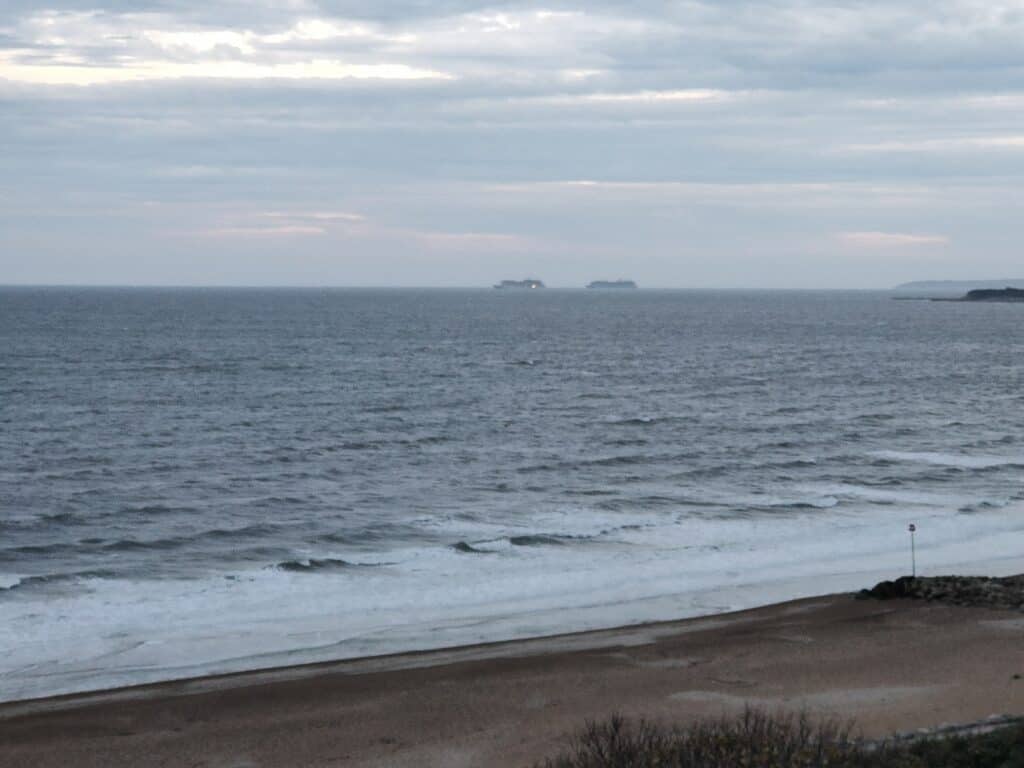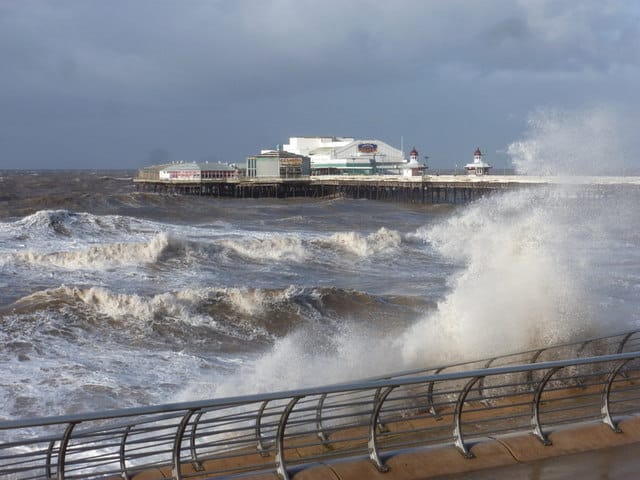Paddleboarding is often seen as a fair weather activity.
In fact if I asked you to close your eyes and picture someone paddle boarding, I very much expect you would think of someone gliding along mirror glass clear water with crystal blue skies and burning sunshine.
Even though these conditions are lovely, unfortunately the sun isn’t always shining and the water isn’t always still.
In fact where I live on the south coast of England, it is more often than not slightly choppy out on the water.
So this brings up the question.
Can you paddle board in choppy water?
You certainly can paddle board in choppy water, choppy water will make paddle boarding more challenging both technically and physically.
Paddle boarding in choppy water can be a great way to improve your overall ability. Before entering choppy water you must ensure your ability matches the conditions.
Now the more true answer to this question obviously depends on your definition of choppy.

If you consider massive storm swells as choppy conditions then you probably don’t want to get your favourite paddle board and head down to the beach.
If however, you consider choppy water anything isn’t flat and still then of course paddleboarding in these conditions will not be an issue.
When is it Too Choppy To Paddle Board
So we now know that is perfectly acceptable and in fact encouraged to paddle board in choppy water but as I said above, this does depend on your definition of choppy.
So when is it too choppy to paddle board?
This really depends on your ability. If you are a very experienced paddler you may have no issues with very choppy water.
I would suggest though, that where the choppy water is a result of storms or very strong winds it is not advisable to go in the water let alone paddleboarding.
Now it’s not necessarily the choppy water or the waves that are dangerous, it is often the things you can’t such as strong undercurrents that can be really dangerous.
Now that’s not to say that the powerful wind swells can’t do some serious damage still.

If you have severe weather conditions battering your local water way refer to your local water safety authority such as lifeguards to see what their current stance is.
What To Do if it is Too Choppy In The Sea
So you have woken up to weather warnings and the beach or sea is a mess with rough seas and monster waves crashing left, right and centre.
But you are still itching to get out on your paddleboard.
What options do you have?
Well firstly you need to consider if it is too dangerous to even attempt to go out and secondly you need to consider whether it is too dangerous for your current ability level.
Once you have established these two things, the next thing I would strongly advise is that you have someone accompany you or at worst you notify someone that you are heading out on the water and give them an exact location of where you are going.
With the health and safety out of the way we can get into what I actually suggest you do in these situations.
As I’m sure you are aware, choppy rough seas are a result of high wind speeds, so it goes without saying that if you can find somewhere nice and sheltered where the wind does not have as much of an effect on the water, you can still get out on your board and have a great time with very little disruption.
The more difficult factor though is finding somewhere sheltered that is safe to paddleboard in.
If you want to still go out in the sea or ocean you are going to need a bit of local knowledge and also be very conscious of the wind direction.
For example where I live in Bournemouth, when we are being pounded by strong winds and stormy swells there are a few different locations I can go to escape the winds but still enjoy the swells.
The easiest way to find these spots is either to simply drive along the coast until you find somewhere or to take note of the wind direction and use a map to determine where there might be some shelter.

The preferred option to going out to sea though would be to find a lake, river or even dock that is sheltered and free of high winds and choppy waters.
If you notice a ‘storms a brewing’ be sensible and always be safe, but look for somewhere nice and sheltered to still get the most out of your paddle board.
How To Paddle Board in Choppy Water
As I stated earlier, paddle boarding in choppy water is considerably more challenging than flat water.
This is because choppy water generally doesn’t follow a uniform direction, this means when you are paddling you will likely be getting rocked left, right, backwards and forwards.
This obviously makes remaining balanced a lot more challenging as you must react and make micro adjustments constantly to ensure you don’t get toppled off your board.
The main thing that you should ensure you do when paddleboarding in choppy water, is getting into the correct stance to offer yourself the best chance of staying stable on the board.
As the board will be rocking in various directions you will first want to get a nice wide stable stance.
I would suggest placing your feet slightly further than shoulder width apart.

This will ensure your weight stays in the centre of your body and should you rock left or right you can load your weight on to the relevant leg to prevent losing balance.
The next thing you should do is bend your knees slightly, it is vital that if you want to remain balanced you don’t lock your legs.
By bending your knees slightly it allows you to make micro-adjustments much easier to go with the flow rather than fighting against it.
If you don’t quite understand what I mean ask a friend to help you out with a little experiment.
Stand bolt up right with your legs locked straight and ask a friend to give you a little push.
Now repeat the experiment with a slight bend in your legs.
I bet you were able to withstand and handle the push better when you had a slight bend in your legs.
Bending your knees slightly not only makes for a more stable, balanced position but it also helps keep your legs engaged so they are ready to react.
Best Board For Choppy Water Paddling
This question has many different answers and honestly no one answer is correct.
Paddle boards are generally quite unique things, what one person loves, another person hates.
Choosing a board can be very divisive, this is mainly because I don’t know what you want to do on that board.
As a general rule of thumb the best board for choppy waters is one that is quite wide, between 30”-34”.
Now the reason I say this is because the wider the board the more stable it is on the water and the more room for error you have.
However this width of board may be a terrible choice if you are planning on going SUP racing or going for what is known as a ‘down winder paddle’.
This is because the wider the board, generally speaking the greater the drag in the water, so although the board will be nice and stable it would greatly slow you down.
When it comes to which board you ride in choppy conditions it does greatly come down to ability and preference.
If you want some help on choosing a board that is right for you, I would suggest checking out the articles below or heading over to my recommended gear page for all my top picks.
- Best Beginner Board
- Best SUP Surfing Board
